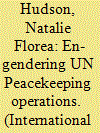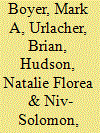| Srl | Item |
| 1 |
ID:
068175


|
|
|
| 2 |
ID:
087570


|
|
|
|
|
| Publication |
2009.
|
| Summary/Abstract |
Increasingly, scholars have taken note of the tendency for women to conceptualize issues such as security, peace, war, and the use of military force in different ways than their male counterparts. These divergent conceptualizations in turn affect the way women interact with the world around them and make decisions. Moreover, research across a variety of fields suggests that providing women a greater voice in international negotiations may bring a fresh outlook to dispute resolution. Using experimental data collected by the GlobalEd Project, this article provides substantial support for hypotheses positing that females generate significantly different processes and outcomes in a negotiation context. These findings occur both in terms of female negotiation behavior and the impact of females as negotiation facilitators/mediators.
|
|
|
|
|
|
|
|
|
|
|
|
|
|
|
|
| 3 |
ID:
096567


|
|
|
|
|
| Publication |
2010.
|
| Summary/Abstract |
The purpose of this review essay is to examine the use of experimental methods and its contributions to international studies research. Following a general discussion of the experimental approach, including the advantages and disadvantages of experimentation in International Relations (IR), this review moves to a categorized discussion of the ways in which experimental methods have contributed to the field of international studies. By invoking economist Alvin Roth's three purposes of experiments-searching for facts, speaking to theorists, and influencing policy debates-this classification scheme helps to identify the overarching purposes of a wide variety of experiments in the field. However, this review seeks to move beyond merely presenting a basic review of the copious experimental literature by also providing an analytical assessment of the function that experimentation serves in IR; that is, to identify and elaborate on experimental research that serves an integrative function, as a bridge across the multiple divides in the landscape of IR. To this end, we introduce a second and original classification framework that allows us to profile in detail a number of singularly significant experimental studies. We then conclude the analysis by highlighting a set of "growth areas" for experimental research that can maintain and expand the already significant contributions of experimental methods to our field.
|
|
|
|
|
|
|
|
|
|
|
|
|
|
|
|